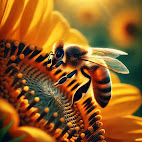The buzz about bees
The Buzz About Bees: Why Our Survival Depends on Them
Imagine a world without apples, almonds, coffee, or even chocolate. Unsettling, isn't it? These staples of our diets, along with countless other fruits, vegetables, and nuts, depend on the unassuming yet extraordinary pollinators we call bees. Despite their small size, bees play an outsized role in maintaining the balance of ecosystems and supporting human life. However, these industrious creatures are facing severe challenges, and it’s up to us to ensure their survival—and ours.A Keystone Species
Bees, particularly honeybees, are often referred to as keystone species. This term means that their activities are crucial to the health and sustainability of ecosystems. Bees pollinate about 75% of the world's flowering plants, including more than 130 types of fruits and vegetables. Without bees, many plants would fail to reproduce, leading to cascading effects throughout the food web. Animals that depend on these plants would struggle to find sustenance, and the ripple effects would extend to predators, including humans.
In economic terms, bees contribute billions of dollars annually to agriculture. This isn't just about money, though; it's about food security and biodiversity.
The Struggles of Bees
Despite their importance, bees are struggling to survive. Their populations are declining at an alarming rate due to several factors:
-
Pesticides and Insecticides: Chemicals designed to kill pests often harm bees as well. Neonicotinoids, a class of insecticides, have been particularly damaging, impairing bees' ability to forage and reproduce.
-
Habitat Loss: Urbanisation and industrial agriculture have reduced the availability of wildflowers and other plants that bees rely on for food.
-
Climate Change: Rising temperatures and unpredictable weather patterns disrupt the flowering schedules of plants, leaving bees without adequate food sources at critical times.
-
Diseases and Parasites: Pests like the Varroa mite and diseases such as colony collapse disorder (CCD) have decimated bee populations worldwide.
These factors combined have placed bees under significant stress. In some regions, entire species of bees have gone extinct, while others teeter on the brink of disappearance.
Why This Matters to You
So, why should you care? It’s simple: bees are essential for our survival.Bees ensure the reproduction of plants that form the foundation of our diets. Without them, the variety of foods available to us would shrink dramatically, leading to nutritional deficiencies and skyrocketing food prices. Bees also contribute to the health of ecosystems that purify our air and water, stabilise soils, and support other wildlife.
But the story is not just about what bees do for us; it’s also about what they symbolise. Bees remind us of the delicate interconnectedness of all life. Their struggles mirror the broader challenges facing our planet due to human activity. Saving bees means taking a step toward a more sustainable future for all species, including ourselves.
A Four-Step Plan to Save the Bees
The good news is that we can all play a part in protecting bees. Here’s a simple four-step plan to get started:
- Stop Using Insecticides One of the most effective ways to help bees is to avoid using insecticides and pesticides in your garden or on your property. These chemicals often contain substances that are lethal to bees, even in small doses. Opt for natural pest control methods, such as introducing beneficial insects like ladybugs or using neem oil.
-
Plant Bee-Friendly Flowers Create a haven for bees by planting a variety of flowers that bloom at different times of the year. Native plants are particularly beneficial because they provide the food and habitat that local bee species need. Lavender, sunflowers, wildflowers, and herbs like thyme and oregano are excellent choices.
-
Raise Awareness Share what you’ve learned about the importance of bees with friends, family, and neighbors. Social media, community meetings, and school projects are great platforms to spread the word. Encourage others to take steps to protect bees and explain why their survival is crucial for all of us.
-
Give the Gift of Bee-Friendly Seeds Help others join the cause by gifting them bee-friendly flowers or seeds. It’s a simple but impactful way to expand the network of bee-friendly spaces. Consider giving these gifts on special occasions or as part of community events.
A Future Worth Buzzing About
Saving bees is not just about preserving a single species; it’s about safeguarding the delicate web of life that sustains us all. Every flower planted, every chemical avoided, and every conversation started contributes to a collective effort to ensure that bees thrive.
The challenges faced by bees seem daunting, but they are not insurmountable. Together, we can create a world where these vital pollinators continue to buzz, pollinate, and prosper. In doing so, we secure a healthier, more sustainable future for ourselves and generations to come.
Let’s commit to this four-step plan. Stop using insecticides, plant bee-friendly flowers, make others aware, and give the gift of life in the form of seeds or plants. The bees are counting on us, and so is the planet. It’s time to act.
Click the link and demonstrate your commitment to saving the bees.
Closing Thought
As you go about your day, take a moment to notice the bees around you. They may seem small and inconsequential, but their impact is monumental. By protecting them, we protect ourselves. Let’s give bees the chance to continue their valuable work. After all, the survival of these tiny pollinators is tied to our own. Together, let’s ensure the buzz never fades.










Comments
Post a Comment